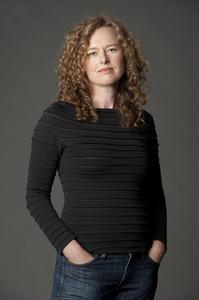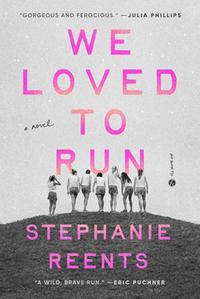
|
|
| photo: John Earle | |
Stephanie Reents's first novel, We Loved to Run (Hogarth, August 26, 2025), is about a women's cross-country team and how far girls will push themselves to control their bodies, friendships, and futures. She's also the author of The Kissing List, a collection of stories that was an Editors' Choice in the New York Times Book Review; and I Meant to Kill Ye, a bibliomemoir chronicling her journey into the strange void at the heart of Cormac McCarthy's Blood Meridian. She has twice received an O. Henry Prize for her short fiction. Reents received a BA from Amherst, a BA from Oxford as a Rhodes Scholar, and an MFA from the University of Arizona. She was a Stegner Fellow at Stanford.
Handsell readers your book in 25 words or less:
My novel is for anyone who appreciates the rich messiness of female friendships and women's fraught relationship to competition and their own beautiful, tender bodies.
On your nightstand now:
Eric Puchner's new novel, Dream State, a family saga set in Montana. Because I love a good sports novel, and table tennis is definitely a sport full of psychological intensity and heartbreak, Underspin by E.Y. Zhao, which will be out in late September. Rosalind Brown's Practice, a kind-of campus novel set at Oxford University about a young woman struggling mightily to lead a life of the mind, which yanked me right back to my own impossible standards for myself when I was a young person striving to be a serious scholar.
Favorite book when you were a child:
As a kid with a fierce independent streak, I was drawn to anything about children making their way in the world without adults. This included The Boxcar Children, Gertrude Chandler Warner's 1924 classic about four orphans leading a very happy and abundant life in a boxcar in the woods. I really loved my parents but, boy, was I intrigued by the idea of testing myself against the world without them.
Your top five authors:
I love so many writers, so it's hard to choose five, but here goes: Haruki Murakami, whose strange imagination is unparalleled; Joy Williams, whose deep and righteous defense of animals and critique of human stupidity reminds me what literature should do; Cormac McCarthy for writing Blood Meridian, just the difficult book I needed to anchor me when I was graduating from college; J.M. Coetzee, whose formal experimentation across his body of work has taught me so much about form; and Aimee Bender for pioneering an American style of feminist magical realism.
Book you've faked reading:
When I was an English professor, one of my colleagues taught a seminar on American literature that included Herman Melville's Moby-Dick, and I took it, thinking I would finally check this American masterpiece off my list. Unfortunately, age has only made me a lazier student, and I found myself skimming a few key chapters before every class in hopes of looking like I was prepared.
 Book you're an evangelist for:
Book you're an evangelist for:
M. Scott Momaday's House Made of Dawn is a gorgeous, devastating, and formally inventive book about an Indian man named Abel returning to his pueblo in New Mexico after fighting in World War II and feeling estranged. While it's a withering critique of the U.S. government's efforts to assimilate American Indians into mainstream American culture, which lasted well into the 20th century, Momaday also translates the visual beauty of the southwestern landscape into prose passages that are completely embodied experiences. I once sobbed in front of the class of first-year college students--like red-faced breathing-through-my-mouth bawled--that's how moved I am by some of the passages in this novel.
Book you hid from your parents:
When I was a teenager, I found The Clan of the Cave Bear by Jean Auel on a bookshelf in my Grandma Frances's living room. If you've read it, you know why I hid it from parents as well as why I was scandalized by the idea of my very nice grandma with her nose buried in its pages.
Book that changed your life:
In college, I read Amy Hempel's slender collection Reasons to Live, which includes the brilliant story "In the Cemetery Where Al Jolson Is Buried." The economy of the stories, the manic dark humor concealing real pathos, the depictions of female friendships and vulnerable bodies--Hempel's style and her subject matter spoke deeply to me as a young woman and made me want to write.
Favorite line from a book:
"On an otherwise unremarkable September morning, long before I learned to be ashamed of my mother, she takes my hand and we set off down New Jersey Avenue to begin my very first day of school." --"The First Day" from Lost in City by Edward P. Jones
Five books you'll never part with:
Siri Hustvedt's The Blindfold; Willa Cather's My Ántonia; Aimee Bender's The Girl in the Flammable Skirt; Edward P. Jones's The Known World; and Marilynne Robinson's Lila.
Book you most want to read again for the first time:
I can remember reading Katherine Dunn's cult classic, Geek Love, in a Peter Pan bus coming back to campus early after an awkward Thanksgiving with a friend's family. I was in a weird state of mind--a little lonely, a little sad--and Geek Love only intensified those feelings by holding me in the grip of the baroque tale of Oly, an albino hunchback dwarf and how her circus family created her and her differently-abled siblings. Discovering Geek Love for the first time was like riding a Tilt-A-Whirl that wouldn't stop.

